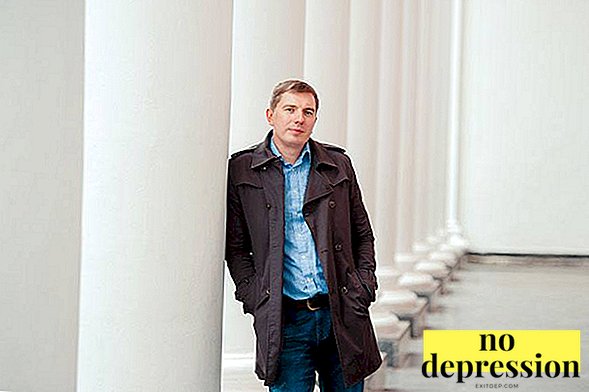The topic of this article fine mental organization. Here I will try to understand what characterizes this type of mental structure and whether it is a type at all. Is it good or bad. Also, I will build reasoning around this concept and answer the question of whether the result of a developed personality, great talent is a tendency to anxiety, deep and strong feelings, hypersensitivity and depression.

After all, it is considered that, as a rule, developed, intelligent, talented, creative people are the most sophisticated and sensitive, and, therefore, suffer the most, unlike a happy but mediocre majority.
In conclusion of the article, I will give advice to people with a fine mental organization, I will help you to find out whether they should live with this quality or get rid of it as from a set of harmful flaws.
What is a thin mental organization?
So, what is a subtle mental organization? It is believed that this is a special mental type, manifested in people of subtle sensitivity. Carriers of this type have the ability to deep and strong experiences, heightened perception, vivid emotions. According to many people, subtle mental organization is the result of developed feelings and intelligence, great talent, refinement and strong moral sense.
What ordinary people consider to be flawed: impulsiveness, touchiness, inability to restrain emotions, anxiety, discouragement, shyness, fearfulness - for a person of fine mental organization is almost a set of evidence of his great mind and talent! He is an artist, a creator or just a very thin person, all these qualities are the results of his gifted nature, we think, and most likely the person of subtle mental organization thinks so about himself.
Myths that we come up with
“Although he was strongly influenced by Hayward, he could not agree with him that indecision is evidence of a fine mental organization; he was angry at the grin with which Hayward looked on his straightness. ”
~ S. Maugham - Burden of the Passions of Men
I have to disagree with this opinion. There is no subtle spiritual organization: in my opinion, this is a huge nonsense that many people were comfortable with believing (this is why you see this article in the “myths” section).
The fact is that many of us are so arranged that we are always ready to fill the totality of our personal qualities with some non-trivial, positive meaning, especially if this process is actively powered by public opinion. A vulnerable, unrestrained, reticent, insecure man suddenly discovers that there is such a thing as a “fine mental organization” and what he previously considered to be flaws turns out to be simply a result of his sophistication, a kind of manifestation of originality among rude and simple ones.
As a result, this individual readily tries on himself the label that makes his shortcomings into the category of almost merits! After all, thanks to this, he can think of himself not as a weakly weak and weak-willed, but as a complex and refined!
I repeat that there is no subtle spiritual organization, in the customary understanding of this term, but there is just a set of certain qualities that receive their qualitative coloring, irrespective of which object they belong to. Weakness and emotional incontinence are bad qualities, and it doesn’t matter who they are, the poet of the enlightenment era or the mover in a nearby shop.
The presence of these qualities suggests that their carriers did not bother to develop in themselves the will and ability to self-control. EVERYTHING! This does not imply any direct connection with someone’s talent or lack of talent, intelligence or stupidity.
Suffering - the lot of geniuses?
Many brilliant, gifted people had many quirks and, indeed, the character of many of them could be described by subtlety of spiritual type. But this does not stem directly from their talent. In my opinion, this is due to the fact that the person endowed with some kind of innate gift, achieves much greater success in the application of his talent than all others.
It is not necessary for a brilliant chess player to develop the qualities that chess sports require in order to shine on the sports Olympus. A less gifted chess player must be emotionally resilient, disciplined in order to achieve some success. Genius is not necessary. By virtue of his talent, he may be more weak-willed and lazy than his rivals, but still achieve better results than they!
An example about a brilliant chess player is taken from a real story. By this I wanted to explain to them that talented people receive less incentives for harmonious development than people who are more mediocre, since with their gift some kind of activity is given to them extremely easily and without any work on the development of other qualities.
A genius is able to receive world recognition and wealth at the expense of his talent, and he can be a complete child in all other areas of life that are not related to his main job. In a person deprived of phenomenal abilities, such a trick very rarely passes: you want it or not, life will force you to grow and develop.
A genius, as I said, remains a child, many properties of his nature remain in their infancy, just because they did not develop them. The absence of this development is only a side effect of his talent, and not direct, because if he wanted to become more decisive, strong-willed, firm in matters of life, he would have become one, nothing would stop him.
But someone decides that the genius does not need it. Although, for example, Einstein, despite the image of a mad scientist, was a harmoniously developed person, judging by his biography. We can not talk about the subtleties of Einstein's spiritual organization, because such, apparently, was absent, despite the obvious talent.
With all these arguments, I want to prove the absence of a direct connection between talent and such qualities as character, will, self-confidence - the lack of development of which is often masked by the notion of “subtle mental organization”. Talented people do not suffer because of talent, but because they cannot solve problems that for other people are not problems at all. It is their weakness, omission, not merit!
It's time to call a spade a spade
“He unpretentiously took his lust for exalted feelings, weak-mindedness for the inconstancy of artistic nature, and laziness for philosophical calm. His mind, vulgar in his attempts at sophistication, perceiving everything in a slightly exaggerated form, is vague, through a gilded fog of sentimentality. He lied, not knowing that he was lying, and when others in this reproached him, he said that the lie is beautiful. ”
~ S. Maugham - Burden of the Passions of Men
You should not take your excessive emotionality as a special kind of refinement. Most likely it is just a spoiled feeling. I urge to call things by their own names, get rid of their shortcomings, and not hide behind muddy terms, such as "thin mental organization" or "rich inner world."
This article, like all the other articles on my blog, is based on personal experience. Once it seemed to me that the causes of my depression, timidity, emotionality, shyness and indecision rooted in some special, sophisticated and complex mental structure, that is, in a certain unique personality type, and not in a common lack.
Of course, it was convenient to think so, because it relieved me of any responsibility for my bad qualities: a spiritual type and that's it — I am not to blame for anything. This is how I am, all refined and feeling.
But, by working on myself, I realized that my shortcomings are of a much more prosaic nature than some subtle personality type. I realized that sensitivity is simply a consequence of a shaky nervous system, emotionality is just an inability to control one’s emotions and a painful obsession with one’s own experiences, and timidity and isolation are the result of a set of complexities and self-doubt. And I began to work on the eradication of these qualities and since then I have achieved significant success.
I am writing this not to boast about my achievements on the basis of self-development, but to show you by my own example that the so-called “fine mental organization” is not some kind of personality attached to you, but just a set of harmful qualities that everyone can get rid of!
If you experience inconvenience due to your lack of communication, shyness and anxiety, you do not need to put an end to these qualities, thinking that they belong to the type of carrier you are. Each person can change himself, lose his shortcomings and develop his best qualities, as I did. If you follow my example, the “subtle mental organization” will also become for you some sort of senseless curiosity and shameful excuse for your weaknesses.
Tips for "sophisticated" people
So, what I can advise people who believe that they have a fine mental organization.
Stop tagging yourself
Attempting to define one’s personality within the framework of a certain spiritual type is the assignment of a label, which, as we have seen before, very roughly summarizes a multitude of phenomena, makes non-existent connections and hides the true nature of things from you. It is easy to say "I have a thin structure of the inner world," so I am so and so, and then spit on it. It is much more difficult to begin to analyze your weaknesses, to realize the reasons for your shortcomings and to direct actions to eliminate them.
Less imitate the heroes of artworks
Great reading, a strong love for world cinema or theater, coupled with your hypertrophied perception can produce one unpleasant effect. Namely, the fact that you will unconsciously try to bring your emotional world in accordance with that of the hero of a work of art.
In classical literature and theater, we see exaggerated passion and bloated emotional experiences and begin to think that strong emotions are a property of truly subtle natures. We forget that the drama, it’s for that and drama, to dramatize (forgive the tautology), to put some features of life to the extreme.
Because of this, we begin to overestimate our emotions, behave like heroes of books or performances, because in hot gusts emotionally we see refinement, wealth of the inner world, and not a banal inability to sober, devoid of emotions thinking.
Stop unknowingly imitating the heroes of old novels, as they often behave very silly. For example, suicide due to unhappy love is not a proud and romantic act, but a great folly and weakness, a consequence of a lack of understanding of the nature of your emotions, an inability to find a sober and sensible solution to problems.
No this is not a tragedy, as the latter implies a situation in which a person became a victim of uncontrollable elements. Here he simply could not cope with his emotions.
In works of art, we constantly see problems that are bloated because of trivia by the heroes themselves, ill-considered, impulsive actions leading to tragedy and uncontrollable feelings. This psychology is reminiscent of the child's behavior: impulsiveness, impermanence, the prevalence of emotions over common sense. You should not adopt this type of psyche and come up with a beautiful name for it.
Temper your temper
Are you too sensitive? Learn to control your emotions. You are constantly shy - work on yourself to stop being shy. Are you often nervous? Learn how to stop being nervous. The materials of my blog will help you develop your weaknesses and stop seeing in them the ineradicable properties of your spiritual world.
What do we lose when we lose the fine mental organization
It would be a mistake to think that if you get rid of what is called “subtle mental organization”, you will forever lose what is connected with the positive side of this phenomenon: the ability to feel people, to subtly perceive works of art, to empathize with loved ones, to enjoy the beauty of nature etc.
I assure you, these abilities are in no way connected with hypertrophied emotionality, incontinence, and weak character. And all the inconsistencies of the phenomenon considered in the article are due to the fact that they are trying to connect and merge these things within the framework of the term describing this phenomenon! As if a brave, strong-willed, self-confident person will not be capable of creativity, comprehension of art, empathy, unlike a weak and vulnerable person.
It's not like that at all. The term “subtle mental organization” was coined to justify the lack of development of some qualities by the fact of having other virtues (“I am cowardly and reserved in myself because I am very clever, talented, etc.). But within the harmonious personality, all good qualities develop simultaneously: someone can be talented, smart, and creatively gifted, while he will be able to cope with life's tasks, communicate with people and be capable of bold and decisive measures.
After all, one does not interfere. What is constantly forgotten by those who believe in some kind of mythical spiritual organization.



